The mass of mankind is ruled not by its own intermittent moral sensations, still less by self-interest, but by the needs of the moment. It seems fated to wreck the balance of life on Earth — and thereby to be the agent of its own destruction. What could be more hopeless than placing the Earth in the charge of this exceptionally destructive species?
Homo rapiens is only one of very many species, and not obviously worth preserving. Later or sooner, it will become extinct. When it is gone Earth will recover. Long after the last traces of the human animal have disappeared, many of the species it is bent on destroying will still be around, along with others that have yet to spring up. The Earth will forget mankind. The play of life will go on.
— John Gray
PREPARING FOR CIVILIZATION’S END
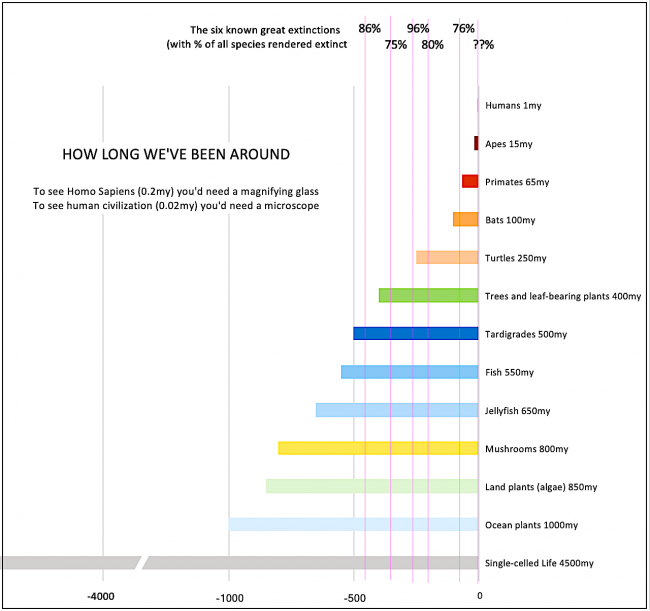
How long we’ve been around: From paleobiologist David Hickey on the super-volcanoes that almost rendered the human species extinct practically before it got started: “An eruption occurred 39k years ago where Naples, Italy is now located. It probably had its greatest effect in Europe. It apparently resulted in regional extinctions of both the resident human culture and that of neanderthals. Those replacing them were from a different culture. Earlier, about 70k years ago the Mt. Toba, Sumatra eruption was even larger and apparently had world-wide consequences. Geneticists estimate human population [in the following millennium was reduced to between 2,000 and 20,000].” There have likely been tens of thousands of such cataclysmic events in the timeline depicted above, and our species barely survived the only two it’s faced. Our current collapse, the sixth great extinction, is almost certain to dwarf the super-volcanoes in its ecological impact.
Coming unglued: Brutus describes the collective madness that seems to be unfolding worldwide as hope and illusion yield to despair, fear and anger:
That’s where we are now, retreating into magical thinking we supposedly left behind in the wake of the Enlightenment. Call it the Counter-Enlightenment (or Un-Enlightenment). We’re on this track for a variety of reasons but primarily because the bounties of the closing Age of Abundance have been gobbled up by a few plutocrats. Most of the rest of population, formerly living frankly precarious lives (thus, the precariat), have now become decidedly unnecessary (thus, the unnecessariat). The masses know that they have been poorly served by their own social, political, and cultural institutions, which have been systematically hijacked and diverted into service of the obscenely, absurdly rich.
Dark knowledge: Catherine Ingram has written a long essay on collapse and our emotional reaction to it, and where we go from here. Her list of suggested responses at the end of the essay is quite similar to my Being Adaptable reminder list. Excerpt:
For decades, I had sensed that things were dramatically worsening, the rate of destruction increasing. We are not facing merely a Black Swan event. We are facing a sea of black swans. As a journalist from 1982 to 1994, I specialized in social and environmental issues. I had written about global warming, the phrase we used in those days, numerous times in the 1980s, but because it seemed a far-off threat, we could intellectually discuss it without fear of it affecting our own lives in terribly significant ways. As time marched on, I began to awaken to how fast the climate was changing and how negative its impacts. It became a strange relief to read and listen to the truth of the situation from people who were studying the hard data as it affirmed my instincts and threw a light on what had been shadowy forebodings, dancing like ghosts in my awareness. It is an ongoing study that has taken me through a powerful internal process–emotional and cathartic–one that I felt might be helpful to share with those who have woken to this dark knowledge or are in the process of waking to it, just as I, over time, found comfort in the reflections of the small yet increasing number of comrades with whom I share this journey.
Because the subject is so tragic and because it can scare or anger people, this is not an essay I ever wanted to write; it is one I would have wanted to read along the way. But the words on these pages are meant only for those who are ready for them. I offer no hope or solutions for our continuation, only companionship and empathy to you, the reader, who either knows or suspects that there is no hope or solution to be found. What we now need to find is courage.
LIVING BETTER
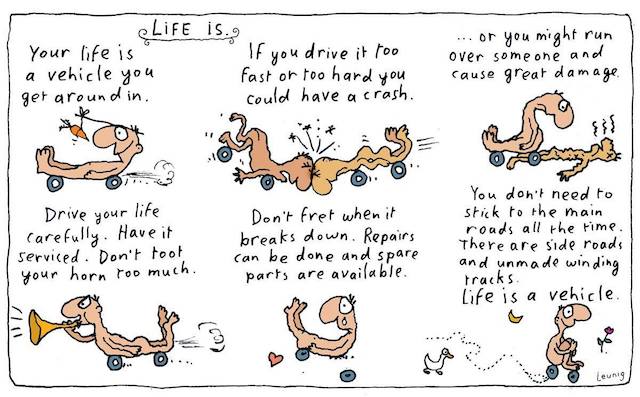 cartoon by Michael Leunig; thanks to NTHELove for the link
cartoon by Michael Leunig; thanks to NTHELove for the link
What’s the best milk?: There’s no perfect answer for your health and for the environment, but, bottom line, anything is better than dairy milk, and organic soy and oat milk have a slight edge over the alternatives.
How many stars are there?: Uncountable. Unknowable. Unimaginable.
Eating better: The USDA in the US is again reviewing its dietary guidance this year, with input from ‘interested parties’. Like in Canada, that process is overwhelmingly dominated by corporate interests in Big Ag, which depends on misinformation on the direct connection between the industrial diet and most of the diseases that sicken and kill Americans. Public health is consistently sacrificed. It was different last time around in Canada, though the Conservatives have vowed to scrap the new health guidelines and invite industrial agriculture to rewrite them to their specifications again. The current US guidelines are industry gold: they encourage consumption of dairy, meat, poultry, seafood and eggs — a payoff to all the Big Ag sectors. Their sample ideal meal includes cow’s milk, and their sample vegetarian ideal diet includes significant amounts of dairy and eggs. They also encourage exercise, but only up to the pathetic 2008 Physical Activity Guidelines (10 minutes a day of vigorous exercise or 20 minutes a day walking), ostensibly because they patronizingly think Americans will balk if asked to do any effective level of exercise. But there are competent, unbiased doctors and dieticians out there trying to improve the recommendations, such as Michael Greger and Brooke Goldner.
POLITICS AND ECONOMICS AS USUAL
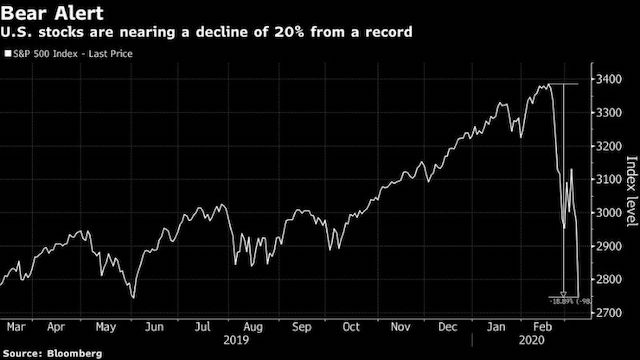
Thomas Piketty on the demise of capitalism: Unregulated capitalism inevitably creates massive inequality of wealth and power, which leads to unsustainable and dysfunctional behaviours — in politics, in business, in (de-)regulation, and in economic and fiscal policy-making. We need to let this dangerous religion go.
Ezra Klein on the polarization of politics: It’s not that we’re getting more polarized. It’s that the parties, and the media, now oversimplify the choices we face in ways that reflect and reinforce what we say we think we want to hear, and push all the subtleties of every issue under the rug.
Oily economics: The application for the vast Tech Frontier Alberta tar sands bitumen sludge mine has been withdrawn, and while the official market-sensitive reason is politics (progressive Canadians are going to make it increasingly difficult for petrochemical corporations to destroy the planet), the real reason is a different sort of politics (all Canadians are beginning to catch on to the colossally expensive, massive government subsidies needed to enable ruinous petrochemical development to continue). The sludge only nets about $15/bbl in markets, way below the slumping price for ‘real’ oil, and its production cost is vastly higher than that. But Alberta, and some think Canada, will collapse economically without this ‘economic engine’ (traders in its currency, ludicrously, buy the lie, so the CA$ trades as a petrocurrency). Governments have always been the first to blink, but finally some oil companies are starting to do so too.
The Hatchet Job on Bernie Sanders: The NYT and the rest of the corporate media must be breathing a sigh of relief now that their campaign of lies and ‘guest’ editorials to defeat Bernie Sanders appears to have succeeded, again.
FUN AND INSPIRATION
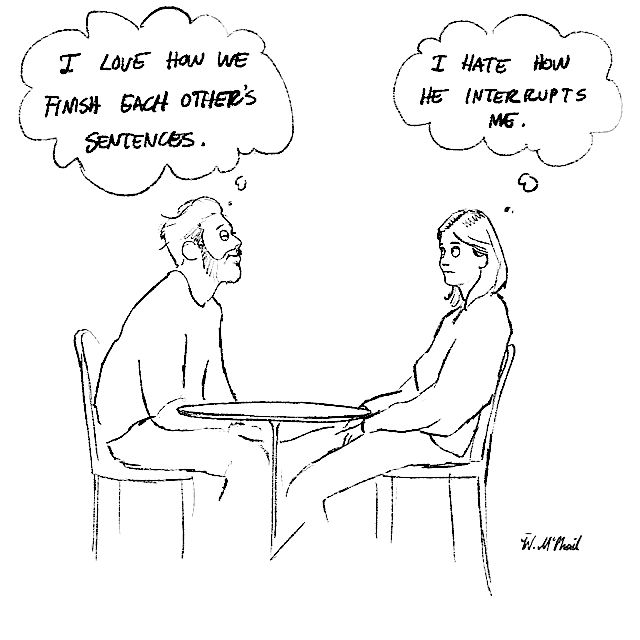
cartoon by Will McPhail in the New Yorker
The story of Abbey Road side 2: A fascinating study of what many think is the finest composition in the history of rock music, and which John Lennon called “junk”.
Talking about trees: The Tyee has an educational and entertaining 5-part interview with renowned tree scientist Diana Beresford-Kroeger.
An animal that doesn’t breathe: Scientists have discovered a distant relative of the jellyfish that has no respiratory system to get oxygen.
A user manual for ‘me’: Cassie Robinson has created a ‘user manual’ explaining her personal operating style, needs, most effective working conditions, and other information to help co-workers ‘get the best’ out of her. It’s a fascinating model, and might work just as well as a self-description to help personal partners get along better too. Kind of related is a ‘relationship smorgasbord’ that invites those in new relationship to explicitly identify what’s ‘included in’ and ‘excluded from’ their relationship, from a menu with different categories for the different aspects of relationship. Thanks to Tree Bressen for the links.
RADICAL NON-DUALITY STUFF
Is the absence of ‘internal monologue’ and a ‘mind’s eye’ analogous to not having a ‘self’?: Many people are shocked to discover that most others often have ‘internal discussions’ in their heads, and can visualize things in their minds — when they themselves have neither capacity. These incapacities don’t seem problematic or even noticeable to the rest of us, but the sudden realization that one has them, and never knew it, can be unnerving. I wonder whether this is analogous to not having a ‘self’ — a sense that one is a real, separate person resident in a body with choice and control over what the person does. I’ve now met dozens of people who have lost their sense of self, and while that loss was definitely noticeable to ‘them’, it apparently had little effect on how others, even family members, perceived them, or how the apparent character ‘left behind’ after the loss continues to function. So perhaps it’s possible that there are millions out there who have never had a sense of self, a sense that they and things around them are real and separate — and that absence has never been missed.
THOUGHTS OF THE QUARTER
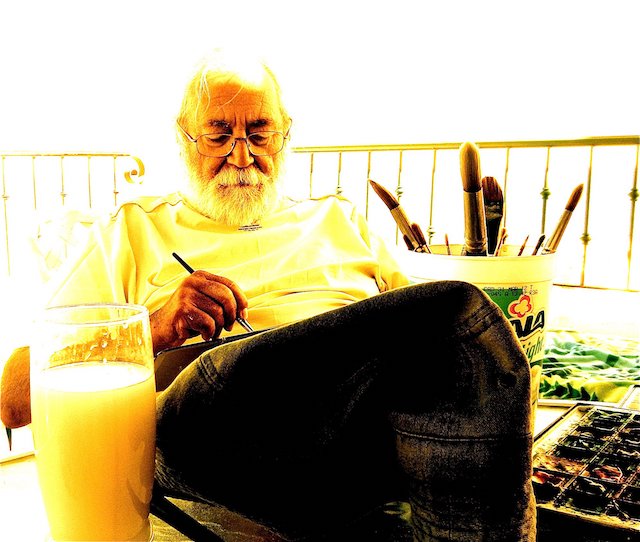
new self-portrait by my friend Ron Woodall
Excerpts and quotes by others from John Green’s podcast Capacity for Wonder and Sunsets, and his novel Turtles All the Way Down:
who are you,little i
(five or six years old)
peering from some high
window;at the gold
of november sunset
(and feeling:that if day
has to become night
this is a beautiful way) [EE Cummings]
“Color is a fiction of light.” [Tacita Dean]
At some point in life, the world’s beauty becomes enough. You don’t need to photograph, paint, or even remember it. It is enough. [Toni Morrison]
“The greatest weapon against stress is our ability to choose one thought over another,” William James said. I don’t know what superpower William James enjoyed, but I can no more choose my thoughts than choose my name. The way [ I experience thoughts is] not as a choice but as a destiny. Not a catalog of my consciousness, but a refutation of it.
The really scary thing is not turning and turning in the widening gyre; it’s turning and turning in the tightening gyre. It’s getting getting sucked into a whirlpool that shrinks and shrinks and shrinks your world until you’re just spinning without moving, stuck inside a prison cell that is exactly the size of you, until eventually you realize that you’re not actually in a prison cell. You are the prison cell.
From an interview in the WSJ:
Several years ago, while sea kayaking off Washington state, author Darcey Steinke saw what a guide told her was the oldest-known killer whale on Earth, an orca named Granny believed by some experts to be 105 when she died in 2016. Ms. Steinke still thinks about this matriarch and others like her. (Killer whales and humans are the only known species whose females experience menopause.) “These whales lead their pods,” she said. “Nobody offers them hormone therapy. They just lead.”
From Bob Dylan’s A Hard Rain’s Gonna Fall:
I’m goin’ back out ‘fore the rain starts a-fallin’
I’ll walk to the depths of the deepest black forest
Where the people are many and their hands are all empty
Where the pellets of poison are flooding their waters
Where the home in the valley meets the damp dirty prison
Where the executioner’s face is always well-hidden
Where hunger is ugly, where souls are forgotten
Where black is the color, where none is the number
And I’ll tell it and think it and speak it and breathe it
And reflect it from the mountain so all souls can see it
Then I’ll stand on the ocean until I start sinkin’
But I’ll know my song well before I start singin’
And it’s a hard, it’s a hard, it’s a hard, it’s a hard
It’s a hard rain’s gonna fall
From Matilda Joslyn Gage — women’s suffragist, Native American rights activist, abolitionist, free thinker, and author, in 1887: “Oh, rebellious woman, to you the world looks in hope.” (Thanks to Kate Coffey for the link.)





How long did it take you to pull all this together ?
(Great) newsletter as blog post. Thanks.